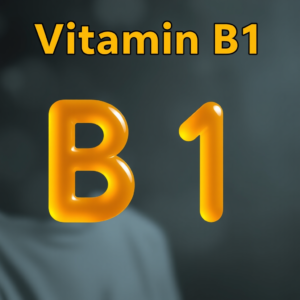Vitamin B1 (thiamine) Facts And What Can Do For You
Water soluble. As with all b-complexes, any excess is excreted and not stored in the body. It must be renewed daily and is measured in milligrams (mg). Because they are synergistic, b vitamins have a stronger effect when they are combined than when they are used separately. To work effectively, vitamins B1, B2, and B6 should be equal in quantity (ie 50 mg of B1, 50 mg of B2, and 50 mg of B6).
The official recommended daily allowance (RDA) for adults is 1.0 to 1.5 mg. (during pregnancy and lactation, 1.4 to 1.6 mg is recommended.) Needs increase during illness, stress, and surgical interventions. It is known as the “moral vitamin” because of its beneficial effect on the nervous system and spiritual state. Has a mild diuretic effect.

What Vitamin B1 Can Do For You:
- Supports growth.
- Facilitates digestion, especially of carbohydrates.
- Improves your spiritual condition.
- Keeps the muscles, nervous system, and heart functioning normally.
- They help prevent altitude or sea sickness.
- Relieves dental postoperative pain.
- Helps in the treatment of herpes – zoster.
Diseases Caused by Vitamin B1 Deficiency:
The Best Natural Foods of Vitamin B1:
Dry yeast, rice husks, whole wheat, oatmeal, peanuts, pork, many vegetables, bran, and milk.
Toxicity:
This water-soluble vitamin is not known to have any toxic effects. Exceeding the dose is excreted through urine and is not stored to any extent in tissues or organs.
Rare symptoms of overdosage consist of shivering, cold sores, swelling, nervousness, rapid heartbeat, and allergies.
Enemies:
The heat that develops when cooking food easily destroys this B vitamin. Other enemies of vitamin B1 are caffeine, alcohol, food processing methods, air, water, estrogen, and sulfonamide preparations.
Personal advice:
In case you smoke, drink, or consume a lot of sugar, you need more vitamin B1. If you are pregnant, breastfeeding, or using contraceptive pills, you have a greater need for this vitamin.
If you usually take an antacid after dinner, you are losing thiamine, which you might get from lunch. In all stressful situations – illness, anxiety, trauma, post-operative shock – your B-complex vitamin intake, which includes thiamine, should be increased.














Post Comment